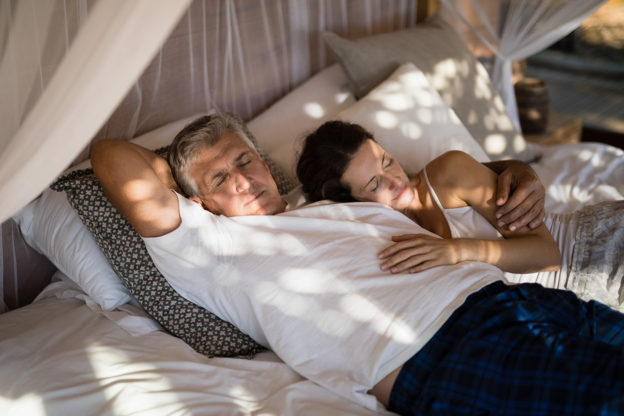By David Blyweiss, M.D., Advanced Natural Wellness
January 8, 2018
- Want to fall asleep faster?
- How your devices are messing with your sleep
- Amber-tinted glasses may provide relief for insomnia
When I was growing up there weren’t any smartphones or tablets. And once the television went off the air at midnight, the house went dark. Everyone was tucked in for tonight.
My how things have changed! These days, people are snuggled up with their personal devices or watching their flat screen TVs well into the wee hours of the morning. And it’s not only ruining their sleep, it’s destroying their health.
If you’re not getting a full seven or eight hours of quality sleep each night, you already know you’re going to muddle through the next day. But I’ll bet you didn’t know that poor sleep is associated with all sorts of chronic health conditions – ones that you want nothing to do with.
This includes some pretty serious health issues, such as an increased risk of heart attack and stroke, a 75% greater chance of developing diabetes and higher odds of cognitive decline.
Lack of sleep also leads to chronic inflammation, depression and weight gain – which further increase your risk of falling prey to dangerous health conditions.
MD Exposes the Hidden Danger to Your Eyes

When your eyesight starts to fail, it's a real problem. Suddenly you can't go to the grocery store... you can't get to the doctor if you have an emergency... you can't meet your friends for dinner…
Your "regular" doctor doesn't have time to keep up with the latest research. And the same goes for eye doctors. They go to school to learn how to fit you for glasses and contacts, but have no way of preventing the damage and loss of eyesight that threatens your freedom and independence.
Let me show you something that explains a LOT about how your eyes work.
In my FREE Special Report, I'll show you a HUGE, untapped resource for your eyes that safely and naturally restores clear, effortless eyesight.
Click here to get started...
And here’s the thing.
It’s not only the time you spend viewing electronic devices that keeps you awake at night. It’s the lingering effects of all the blue light they emit.
How Your Devices are Messing with Your Sleep
The short-wavelength blue light produced by computers, tablets, cell phones and the television suppresses your body’s production of melatonin. This hormone is intimately involved in regulating your sleep and wake cycle.
Under normal circumstances, melatonin starts rising about two hours before bedtime. However, if you spend those two hours exposed to a light-emitting device, it can actually suppress melatonin production by about 40%. That blue light also has a tendency to increase alertness, perhaps even more so than a cup of coffee would.
This severely disturbs your body’s natural circadian rhythm… the “master clock” that regulates your natural sleep/wake cycle. It makes it harder to go to sleep at night, tough to stay asleep until morning, and leaves you dragging through the following day.
The obvious solution is to shut down your devices a few hours before you want to go to sleep. But not everyone wants to hear that.
If you are so attached to your devices that you simply refuse to turn them off an hour or two before bedtime, there may still be hope for a good night’s sleep in your future.
Are You Suffering From...
- Love handles and a pot belly
- Romance that isn't what it used to
- Forgetfulness and inattention
- Low (or no) strength and endurance
- A sex drive that's shifted into neutral...or worse
If so...you may have Mature Male Burnout. Click here to discover more about this unique condition and what you can do about it.
Amber-Tinted Glasses may Provide Relief for Insomnia
You may not know this, but today many Android and Apple devices have a “night mode”, or blue light filter. This built-in app automatically detects when it is night, and reduces the amount of blue light the phone/tablet emits. It’s a good idea to check out your smartphones and tablets to see if they have this app. If so, all you have to do is turn it on.
However, it may not be available on all devices… and it certainly doesn’t apply to your television or PC.
In that case, it’s a good idea to invest in a pair of amber-tinted glasses that are developed especially to block blue light. (You might be surprised to learn that this type of lens was originally developed using NASA licensed technology for use in the space program.)
People who use this type of glasses can improve their nighttime melatonin levels by about 58% compared to people who don’t use them. This is a higher boost than what you would get if you were to take a melatonin supplement.
Additionally, people who wear blue light blocking glasses while working on their devices in the evening report greater sleep duration, better quality of sleep, sounder sleep and an overall reduction in insomnia severity. These lenses may also help reduce symptoms of eyestrain and fatigue after a long day spent in front of the computer or laptop.
Personally, I prefer you shut your devices down altogether well before bedtime. But if you can’t find it in you to do that, a pair of amber-tinted blocking glasses is your second best option.
SOURCES:
Grandner MA, et al. Sleep disturbance is associated with cardiovascular and metabolic disorders. J Sleep Res. 2012 Aug;21(4):427-33.
Lo JC, et al. Sleep Duration and Age-Related Changes in Brain Structure and Cognitive Performance. Sleep. 2014;37(7):1171-1178.
Knutson KL, et al. Associations between sleep loss and increased risk of obesity and diabetes. Ann N Y Acad Sci. 2008;1129:287-304.
Figueiro M, et al. Self-luminous devices and melatonin suppression in adolescents. Lighting Research and Technology. 2015 May;48(8):966-975.
NASA scientists found inspiration in nature for a spinoff that now protects and enhances vision on Earth. National Aeronautics and Space Administration. Last Updated: Oct 2012.
Ostrin LA, et al. Attenuation of short wavelengths alters sleep and the ipRGC pupil response. Ophthalmic Physiol Opt. 2017 Jul;37(4):440-450.
Shechter A, et al. Blocking nocturnal blue light for insomnia: A randomized controlled trial. J Psychiatr Res. 2018 Jan;96:196-202.
Lin JB, et al. Short-Wavelength Light-Blocking Eyeglasses Attenuate Symptoms of Eye Fatigue. Invest Ophthalmol Vis Sci. 2017 Jan 1;58(1):442-447.







